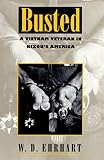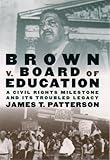|
|
Help |
| Home - Basic A - Asian-american Government & Legislation (Books) | |
e99 Online Shopping Mall
|
|
Help |
| Home - Basic A - Asian-american Government & Legislation (Books) | |
| 1-7 of 7 |
click price to see details click image to enlarge click link to go to the store
| 1. Busted: A Vietnam Veteran in Nixon's America by W. D. Ehrhart | |
 | Hardcover: 146
Pages
(1995-06)
list price: US$27.50 -- used & new: US$23.27 (price subject to change: see help) Asin: 0870239554 Canada | United Kingdom | Germany | France | Japan |
| 2. Brown v. Board of Education: A Civil Rights Milestone and Its Troubled Legacy (Pivotal Moments in American History) by James T. Patterson | |
 | Hardcover: 320
Pages
(2001-03-01)
list price: US$30.00 -- used & new: US$36.46 (price subject to change: see help) Asin: 0195127161 Average Customer Review: Canada | United Kingdom | Germany | France | Japan |
|
Editorial Review Product Description Patterson outlines the stories of several influential pre-Brown cases and details the thinking and exploits of the legal minds involved with Brown, including Marshall and Chief Justice Earl Warren. He also follows the various responses to the decision by those most affected by it, including bigoted Arkansas governor Orval Faubus as well as President Dwight Eisenhower. More than a simple chronology, Brown v. Board of Education raises many questions about America's unfinished business of truly democratizing its educational system once and for all. Both instructive and disturbing, this book calls for us to question whether we will turn back the clock or demand movement forward. --Eugene Holley Jr. Customer Reviews (9)
After giving a brief history of Brown (covering, in summary fashion, much of the ground covered by Kruger), Patterson examines the aftermath of Brown.The question Patterson addresses throughout the book is whether Brown marked a step forward in civil rights. Patterson successfully debunks the argument that Brown was a step backwards.As he says, anyone who thinks that the country was better off before Brown had better buy a two way ticket if he wants to go back in time, because he will want to turn right around and come back.Before Brown, most black children were educated in tarpaper shacks, by grossly underpaid teachers, with no supplies, and even less respect. Did Brown solve all problems?Of course not.As Patterson notes, what Brown does do is prove that there are limits to the power of the courts to accomplish social change.However, the Supreme Court did set an unequivocal moral tone, which set the stage for the civil rights movement, which (building on the constitutional foundation built by Brown) changed the world we all live in. Has racism ended?No.But no one should expect any Supreme Court decision (or even a series of decisions spanning less than 25 years) to undo the racial history of this country which had taken 400 years to build.The real shame is that beginning in the late 70's, the courts, Congress, and the President have all worked to reverse the moral tone set in Brown.Unfortunately, they have succeeded all too well.But one can not fairly blame that on the Supreme Court's decision in Brown. A thought provoking book which should be read by anyone who is interested in the history of race relations in the second half of the 20th Century. ... Read more | |
| 3. The NAACP's Legal Strategy against Segregated Education, 1925-1950, With a New Epilogue by the Author by Mark V. Tushnet | |
 | Paperback: 264
Pages
(2005-02-28)
list price: US$21.00 -- used & new: US$18.00 (price subject to change: see help) Asin: 0807855952 Average Customer Review: Canada | United Kingdom | Germany | France | Japan |
|
Editorial Review Product Description Customer Reviews (1)
| |
| 4. Uncivil Wars: The ControversyOver Reparations for Slavery by David Horowitz | |
 | Hardcover: 139
Pages
(2001-12-01)
list price: US$21.95 -- used & new: US$2.25 (price subject to change: see help) Asin: 1893554449 Average Customer Review: Canada | United Kingdom | Germany | France | Japan |
|
Editorial Review Product Description In this well researched and carefully argued book, David Horowitz traces the origins of the reparations movement. He examines the case made by its advocates and concludes that it is "morally questionable and racially incendiary."He notes that only a tiny minority of Americans ever owned slaves; and most Americans living today (white and otherwise) are descended from post-Civil War immigrants who have no lineal connection to slavery at all.More intriguingly, he also points out that the GNP of black America is so large that it makes the African American community the tenth most prosperous "nation" in the world.But this book is more than just an in depth casebook on the hot button issue of reparations. In the hope of initiating a dialogue, Horowitz originally presented a summary of his ideas on this subject in the form of an advertisement that appeared in several college newspapers and was rejected by many more. Editorialists in America's leading papers and several chapters of the American Civil Liberties Union weighed on Horowitz's side. With the assistance of Richard Poe, Horowitz uses the response to the reparations issue to show how the new racial orthodoxy collides with the free speech battle and what its implications are for American education and culture. Customer Reviews (88)
| |
| 5. Containing the Atom: Nuclear Regulation in a Changing Environment, 1963-1971 by J. Samuel Walker | |
| Hardcover: 533
Pages
(1992-10-08)
list price: US$58.00 -- used & new: US$214.94 (price subject to change: see help) Asin: 0520079132 Canada | United Kingdom | Germany | France | Japan | |
|
Editorial Review Product Description | |
| 6. Slavery and Its Consequences: The Constitution, Equality and Race (Aei Studies) by Art Kaufman | |
| Hardcover: 181
Pages
(1988-09)
list price: US$25.25 Isbn: 084473649X Canada | United Kingdom | Germany | France | Japan | |
|
Editorial Review Product Description | |
| 7. Gulf War 1990-91 in International and English Law by Peter Rowe | |
 | Kindle Edition: 480
Pages
(2007-03-14)
list price: US$260.00 Asin: B000OI0OS6 Canada | United Kingdom | Germany | France | Japan |
|
Editorial Review Product Description | |
| 1-7 of 7 |